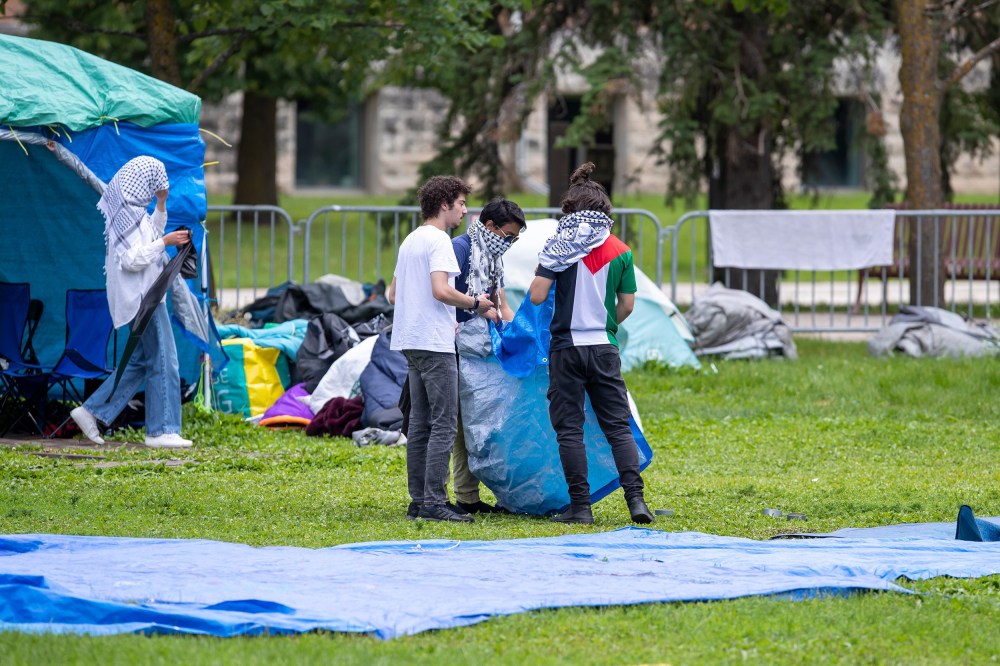A months-long encampment at Manitoba’s largest university may soon be coming to an end, with school administrators threatening legal action against the pro-Palestinian protesters occupying the site.
In a statement issued last week, the University of Manitoba warned protesters they had until 8 a.m. Monday to dismantle the encampment “or (the university) will pursue legal remedies for its removal.”
The encampment — which includes several tents, signs and flags encircled by metal fencing — was erected on the campus quad May 7, joining a wave of similar demonstrations at Canadian and American universities.

Pro-Palestinian protesters help to clean up and dismantle an encampment at the quad at the University of Manitoba’s Fort Garry campus in Winnipeg on Sunday.
According to the statement, the threat of legal action comes after failed attempts to negotiate with the protesters, who have demanded the university boycott Israeli institutions, end student-exchange programs with the Hebrew University of Jerusalem and divulge information about university investments.
“Your right to peaceful protest does not include the ability to continuously occupy university space that is to be enjoyed by all community members,” reads the statement, signed by provost Diane Hiebert-Murphy.
“It is now the expectation of UM leadership that you peacefully dismantle the encampment and return the use of the quad space to the entire UM community.”
On Sunday afternoon, less than a dozen protesters were at the site. They appeared to be in the process of taking down tents and removing encampment infrastructure.
The group declined to confirm whether they planned to heed the university’s warning and leave the quad space as requested.
“We are quite disappointed that our university has put a lot more effort into avoiding negotiations and removing us, as opposed to coming to the table,” encampment member Mer Canjura said.
“One thing that is clear is, regardless of what steps the university is going to take, we are very committed to ensuring that our demands are met,” Canjura said.
Canjura said protesters have met with university leaders three times since the encampment began, with the latest meeting occurring May 31.
The legal threat came as a surprise to protesters, who felt they were exercising their right to peaceful protest, she said.
Similar pro-Palestine encampments across the country have been dismantled in recent weeks, including at universities in B.C., Ontario and Quebec.
Another protest site at the University of Winnipeg folded on June 24 after occupying the campus for more than a month. Protesters there left voluntarily, citing fear of punishment from the university.
The institution locked its doors to the public shortly after the encampment began, saying its presence created safety concerns.
Canjura said organizers in Winnipeg have been watching the goings-on at encampments elsewhere in the country. She referenced an encampment at the University of Calgary, which was forcibly removed by police on May 9.
Protesters have held workshops, potluck dinners and rallies at the University of Manitoba encampment over the last two months.
The university said its insurance policy does not apply to people engaging in unauthorized activities on campus, so people participating in the encampment are liable for any injuries or property damage that occurs.
The university has committed to publicly disclosing its investment holdings in the coming months.
It will not restrict academic partnerships with any international institutions beyond those that are restricted by the federal government, it said.
“UM will not be expanding on our previously communicated commitments or otherwise negotiating on your demands,” the statement said.
The protesters intend to host a news conference at the quad at 11 a.m. on Monday, where they will provide an official response to the university’s threat of legal action, Canjura said.
tyler.searle@freepress.mb.ca

Tyler Searle
Reporter
Tyler Searle is a multimedia producer who writes for the Free Press‘s city desk. A graduate of Red River College Polytechnic’s creative communications program, he wrote for the Stonewall Teulon Tribune, Selkirk Record and Express Weekly News before joining the paper in 2022. Read more about Tyler.
Every piece of reporting Tyler produces is reviewed by an editing team before it is posted online or published in print — part of the Free Press‘s tradition, since 1872, of producing reliable independent journalism. Read more about Free Press’s history and mandate, and learn how our newsroom operates.
Our newsroom depends on a growing audience of readers to power our journalism. If you are not a paid reader, please consider becoming a subscriber.
Our newsroom depends on its audience of readers to power our journalism. Thank you for your support.